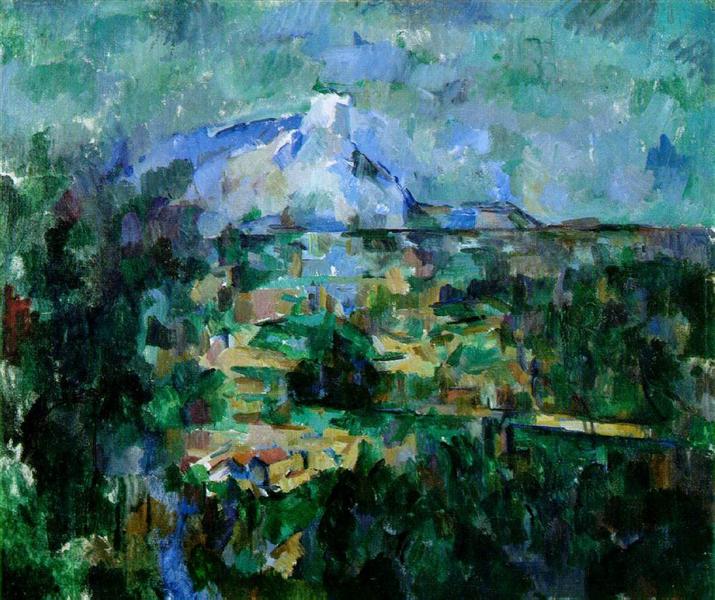Descrição
Paul Cézanne’s “Montagne Sainte-Victoire from Lauves”, painted in 1905, encapsulates the artist’s mastery of depicting landscapes through his unique interpretation of reality. Part of a remarkable set of depictions of the Montagne Sainte-Victoire, this painting reveals both the evolution of Cézanne’s style and his deep connection to the natural environment that surrounded him.
When looking at this work, the first thing that strikes you is the way in which Cézanne constructs the composition. The mountain, monumental and dominant, occupies the centre of the canvas, its shape outlined with a sovereign rotundity that seems almost monumental. The simplification of forms, characteristic of Cézanne's style, is manifested in the way the mountain is presented not only as a natural object, but also as a pure geometric form. The energetic lines and brushstrokes create an almost architectural structure that gives the mountain a tangible and solid presence, defying traditional conventions of pictorial representation to embrace the intrinsic essence of its form.
The use of colour in the work is equally notable. Cézanne deploys a palette in which the blues and greens of the landscape predominate, contrasted with the warm tones that usually characterise the stone of the mountain. This chromatic choice not only highlights the different aspects of the scene, but also suggests the varied light of the Provençal environment. The brushstrokes are visible and deliberate, creating a textured effect that brings the surface of the painting to life. Through the juxtaposition of tonalities, Cézanne achieves a sense of depth and volume, a technique that would become a preamble to the development of Cubism and other later movements.
The lack of human figures in this work is not an oversight; on the contrary, it reinforces the painter’s focus on capturing the landscape itself. Cézanne moves away from figurative narratives to focus attention on the interaction between the mountain and its surroundings, thus suggesting the harmonious coexistence between nature and human beings, even if the latter is absent. This decision aligns with his artistic intention to strip the painting of superfluous elements, leading the viewer towards a purer appreciation of the natural phenomenon.
“Montagne Sainte-Victoire from Lauves” is not only a representation of the landscape; it is a testimony to the deep bond that Cézanne had with his homeland of Aix-en-Provence. The mountain, omnipresent in his work, becomes the symbol of his continuous exploration of form, colour and structure. The repetition of the Sainte-Victoire motif throughout his career is evidence of his fascination with this emblematic place, transforming the visual experience into an exercise in personal and aesthetic reflection.
As a whole, this painting by Cézanne stands as a key piece in the transition to modern art. Its ability to combine precise observation of the natural world with subjective interpretation and formal structure paves the way for later movements that would challenge established norms. “Montagne Sainte-Victoire from Lauves” is, without a doubt, a testament to the genius of its author and his undeniable influence on the history of art. When looking at this work, one does not simply contemplate the majesty of a landscape, but delves into the reflection of a master who continued to redefine the boundaries of artistic representation until his last breath.
KUADROS ©, a famous painting on your wall.
Hand-made oil painting reproductions, with the quality of professional artists and the distinctive seal of KUADROS ©.
Painting reproduction service with satisfaction guarantee. If you are not completely satisfied with the replica of your painting, we will refund 100% of your money.

